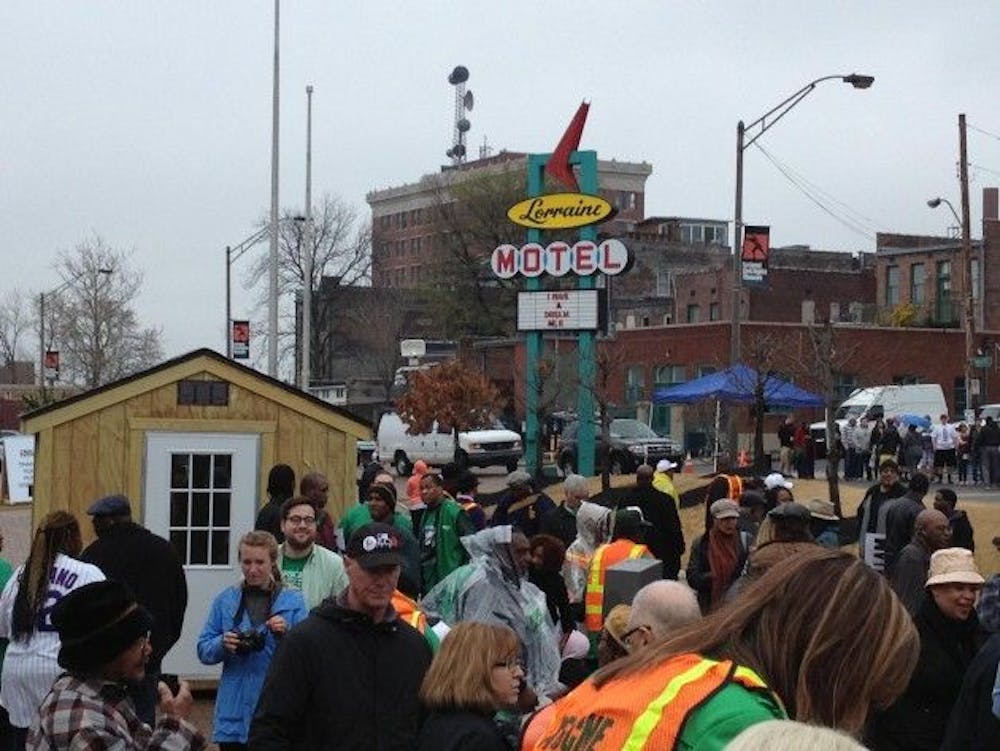On April 3, 1968, Martin Luther King Jr. gave his final and prophetic speech, "I've Been to the Mountaintop," at the Mason Temple in Memphis, headquarters of the Church of God in Christ. The following day, Dr. King was assassinated outside room 306 of the Lorraine Motel.
Forty-five years later, more than a thousand people gathered in downtown Memphis Thursday morning to remember King and to refocus attention on the fight for a living wage.
"The whole purpose of the gathering was to connect the dots between labor movements, civil movements and progressive movements, to look at the progress we've made and the lack thereof," said Chris Policano, a spokesperson for the American Federation of State, County and Municipal Employees in Washington D.C., a labor union commonly referred to as AFSCME.
Thursday's rally started at the union's local headquarters on Danny Thomas Boulevard and Beale Street, where municipal union members of Local 1733 erected a historic sign renaming the road "1968 Strikers Lane." The group then marched to the National Civil Rights Museum where speakers such as Martin Luther King III, King's son; Lee Saunders, president of the national union; and Chad Johnson, president of Local 1733, reminded the crowd that there is still work to be done.
"Think about all the people who make our lives happen," Johnson said. "Those are the people we must acknowledge because without them, there is no us. This is more than one day. This is a movement."
More than 600 members of the Firefighters Association also joined the march, including Memphian Tarrence Jones, 54, a 20-year veteran of the force. Jones said they were marching to support the cause of just wages and benefits.
"We work on contract, and they aren't keeping their part of the contract," said one fireman who requested his name be withheld. "They're trying to take our sick leave, messing with our pensions, taking benefits. We're not so much fighting to get more rights. We just want to keep the ones we're supposed to have."
Gail Tyree, assistant director of Union Local 1733, helped to organize Thursday's events, which included a barbeque lunch and a disc jockey who played popular and old-school hip-hop and dance music. Men and women, black and white, young and old, ate, talked and danced together.
"We are the original home of the strikers, so this march has been in the works for at least a year," Tyree said. "Since this year was the 45th anniversary, we wanted to do something very special."
Dozens of AFSCME members from across the country came to Memphis to support Local 1733. Cheryl Hutchison and Josette Jaramillo work for the municipal union in Colorado.
"We've seen great reception here," Hutchison said. "And it's very, very moving to be here on such a historic day."
Peggy Kinzler, a member of AFSCME Local 65 of Minnesota, agreed.
"It was exciting to see the sea of people together," Kinzler said. "I mean, we're saying 'This is a problem that needs to be fixed.'"
Many participants recalled the Memphis strike in 1968 when 1,300 sanitation workers fought for better wages, benefits, union recognition, safer equipment and dignity.
Alvin Turner, an original striker and one of the few founding fathers of Local 1733 who is still active, also participated.
Another group that came out to march was Unite Here, a group representing restaurant and hospitality workers.
Pamela Stitts, 51, of Memphis, works in Tunica. She said her managers and supervisors are continually cutting hours in order to curb their obligation to provide health benefits and overtime to their employees.
But Mary Reynolds, 45, who also works in Tunica, has seen her work environment improve since 2005. Since then, her wages have increased from about $8 an hour to $10.27, and she no longer works under the "at will" clause, which allows employers to fire any worker without reason.
"We've come a long way, but we still have a lot of work to do," Reynolds said.




